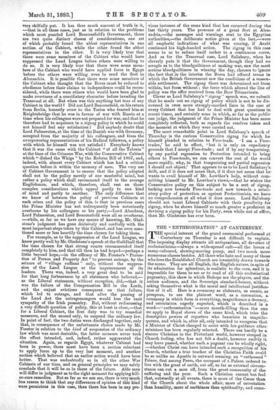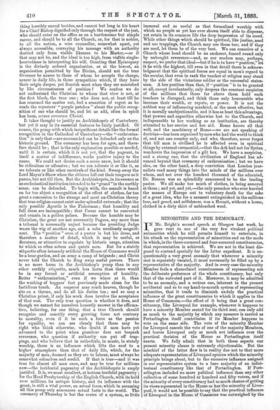THE " ENTHRONISATION " AT CANTERBURY.
THE special interest of the grand ceremonial performed at Canterbury on Thursday is not difficult to explain. The imposing display attracts all antiquarians, all devotees of ecclesiasticism—always a wide-spread cult—all the lovers of many-coloured, slowing-moving pomp, and two much more numerous classes besides. All those who hate and many of those who love the Established Church are irresistibly drawn towards the scene. They are all English, the English nature, in spite of its admiration for splendour, is realistic to the core, and it is, impossible for them to see or to read of all this ecclesiastical pageantry, this show in which Bishops are the players, and the nation audience, and the Sovereign standard-bearer, without asking themselves what is the moral and intellectual justifica- tion of it all. Here is a ceremony as elaborate, as scenic, as pompous, to use the plainest word, as a coronation, a. ceremony in which form is everything, magnificence a decency, and ostentation eagerly expected, which is described in a word—" enthronisation '—more mouth-filling than the one we apply to Royal shows of the same kind, which tries the descriptive powers of reporters who luxuriate in magnilo- quence, and which is, after all, only intended to recognise that a Minister of Christ charged to assist with his guidance other ministers has been regularly selected. There can hardly be a. sincere Christian in the Protestant world, however steeped in Church feeling, who has not felt a doubt, however swiftly it may have passed, whether such a pageant can be wholly right, —whether Christ can have intended such a recognition of his Church, whether a true teacher of the Christian Faith could be so unlike an Apostle in outward seeming, an "enthroned" Prince, first among Peers, the occupant of a Palace, ordered to. live with the great of earth, cut off, so far as external circum- stance can cut a man off, from the great community of the suffering and the poor. Such a Christian cannot but feel that, outwardly at all events, there is more of the Caesar than of the Church about the whole affair, more of ostentation than humility, more of earthiness than spirituality, and some-
thing horribly unreal besides, and cannot but long in his heart for a Chief Bishop dignified only through the respect of the just, who should enter on the office as on a burdensome but simple career, and should be to all the Church, or, for that is nobler, to all the nation, a wise counsellor, somewhat apart, yet always accessible, conveying his message with an authority derived only from visible likeness to his Master,—or if that may not be, and the ideal is too high, from vistble single- heartedness in interpreting his will. Granting that Episcopacy is the divinely ordered organisation, or at the lowest, an organisation permitted by the Divine, should not the true Overseer be nearer to those of whom he accepts the charge, nearer in daily life, in those sympathies which, if they have their origin deeper, yet flourish most when they are nourished
by like circumstances of position We confess we do not understand the Christian to whom that view is not, at the first blush, the true one ; who does not, at least till he has reasoned the matter out, feel a sensation of regret as he reads the reporters' "purple patches" about the public recog- nition of one who should be, and let us add, often in spirit has been, serous servorum Christi.
It takes thought to justify an Archbishopric of Canterbury, 'but yet it may in its essential features be fairly justified. Of coarse, the pomp with which insignificant details like the formal recognition in the Cathedral of Canterbury—the " enthronisa- tion is only that—are surrounded can be defended only on the historic ground. The ceremony has been for ages, and there- fore should be ; that is the only explanation possible or needed, until it is certain, which it is not yet, that the pageant, in itself a matter of indifference, works positive injury to the cause. We could not devise such a scene anew, lest it should be ridiculous or offensive ; but we can tolerate it or like it, as -we tolerate or like other survivals of the kind. Sweep away the Lord Mayor's Show when the citizens loll out their tongues as it passes, but not till then. But the Archbishopric, in its essence as an ecclesiastical institution intended to be "grand" in the earthly 'sense, can be defended. To begin with, the assault is based on far too abject a recognition of the effect of clothes, far too great a concession to the strange and most un-Christian theory that true religion cannot exist under splendid externals • that the only possible Apostle is the Fisherman ; that humility and full dress are incompatible ; that Omar cannot be converted and remain in a golden palace. Because the humble may. be Christian, the great are not necessarily Pagans, any more than a tribunal is necessarily unjust because the presiding Judge wears the wig of another age, and a robe needlessly magnifi- cent. The " position " even of a pastor is but his dress and therefore a matter of detail, which it may be useful, or decorous, or attractive to regulate by historic usage, attention tc; which so often sobers and quiets men. But for a stately etiquette often intensely artificial the House of Commons would be a bear-garden, and an army a camp of brigands ; and Christ never told the Church to fling away useful powers. There ' is no more harm in the Archbishop's pomp than in any other earthly etiquette, much less harm than there would be in any forced or artificial assumption of humility. Better " enthronisation," even if we wince at it, than the washing of beggars' feet previously made clean for the fastidious touch. An emperor may reach heaven, though he sits on a throne, and do all his duties too ; and so may a Christian priest, if only his work does involve the acceptance of that seat. The only true question is whether it does and though we cannot for ourselves honestly answer in the affirma- tive, believing, for one thing, that a true Church should recognise and sanctify every growing force not contrary to morality, even if it be such a force as the passion for equality, we can see clearly that those may be • right who think otherwise, who doubt if men have yet advanced to the point when grandeur does not bespeak .reverence, who question if authority can put off trap- pings, and who believe that in cathedrals, in music, in stately worship, there is an influence which lifts the soul to a higher atmosphere than that of daily life, which, for the majority of men, doomed as they are to labour, must always be somewhat colourless and sordid. If that is true—and it was true for almost all men once, and may be true for millions now—the incidental pageantry of the Archbishopric is amply justified. It is, we must recollect, at bottom truthful pageantry ; for the Head Presbytership of the English Church, with its hold over millions, its antique history, and its influence with the great, is still a vital power, an actual force, which in assuming all this pomp only announces actual facts to the world. The ceremony of Thursday is but the crown of a system, as little
immoral and as useful as that formalised worship with which no people as yet has ever shown itself able to dispense, yet retain in its common life the deep impression of its creed. While other things which should be spiritual, like justice, need and use trappings, the Church may use them too; and if they are used, let them be of the very best. We can conceive of a Church whose head should be an anchoret, fenced round only by unbonght reverence—and, as our readers may, perhaps, suspect, we prefer that ideal—but if he is to have "position," let it be with the highest, till even in that detail there is acknow- ledgment that the spiritual forces are equal in men's regard to the secular, that even in rank the teacher of religion may stand by the side of the victorious soldier or the successful states-. man. A less position than that, if "position" is to be granted at all, except involuntarily, only deepens the constant suspicion of the millions that those far above them hold such teachers in disregard, and think those only honourable who increase their wealth, or repute, or power. It is not the noblest way of influencing mankind, or the most effective, but it is morally unobjectionable, and it has as least this advantage, that powers and capacities otherwise lost to the Church, and indispensable to her working as- an institution, are thereby attracted to her service and her aid. Rome knows all that well, and the machinery of Rome—we are not speaking of doctrine—has been organised by men who had the world to think of, and not one country only, and who, therefore, never forget that till man is civilised he is affected even in spiritual things by external ceremonial,—that the Ark had not for Syrian wanderers the impression of a gilt box. We have a suspicion, and a strong one, that the civilisation of England has ad- vanced beyond that ceremony of enthronisation ; but we have also, on the other hand, a deep conviction that London jour- nalists read many things into the minds of the millions over whom, and not over the hundred thousand of the educated, Dr. Benson was so splendidly announced to be the leading pastor. We all make too much of clothes, in being annoyed at them ; and yet, and yet,—the only preacher who ever hurried the masses of Europe out to voluntary death for the sake of a great idea, who for a moment extinguished in the millions. fear, and greed, and selfishness, was a Hermit, without a home, clothed in a dirty shirt of unbleached wool.



































 Previous page
Previous page